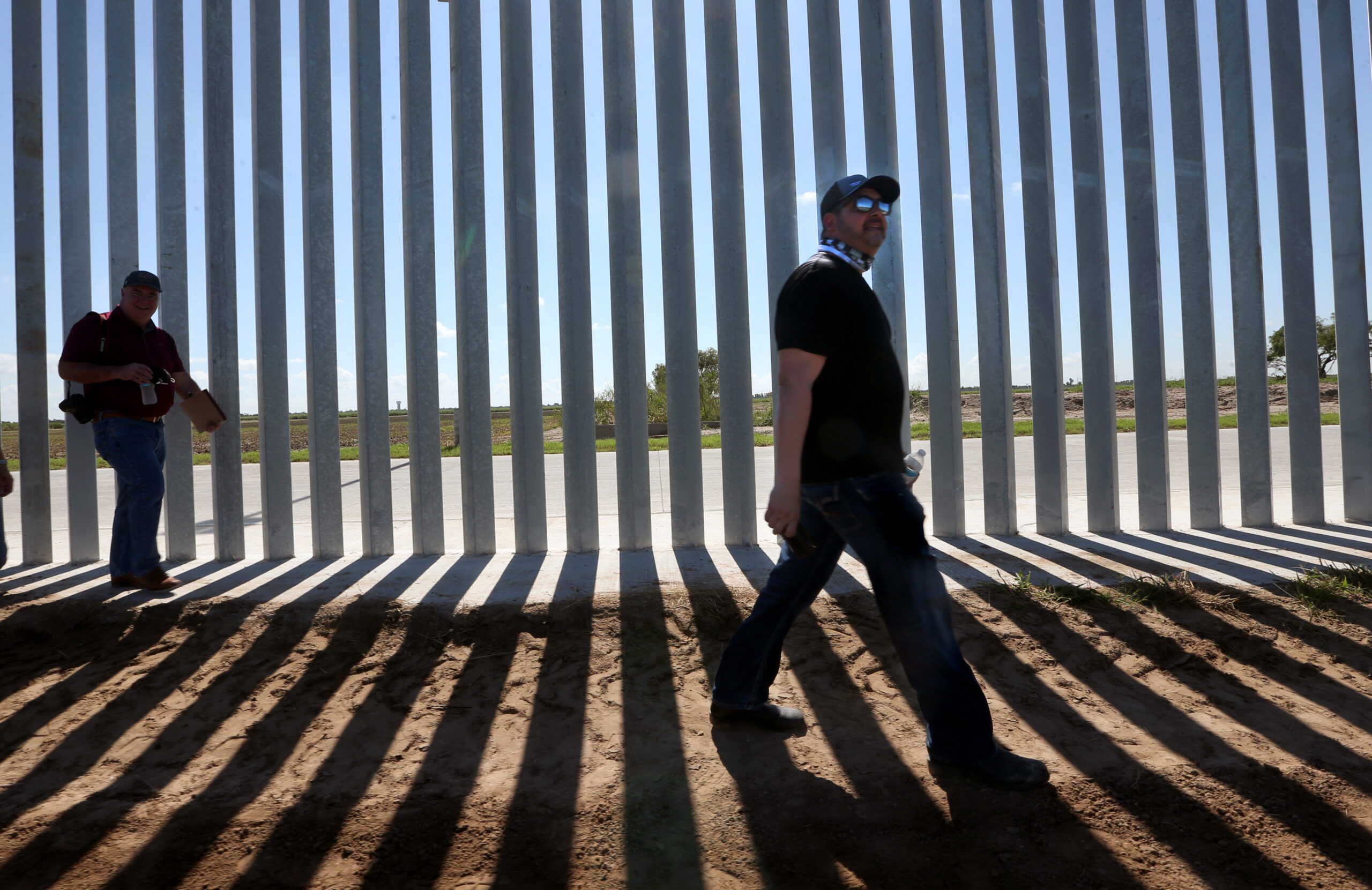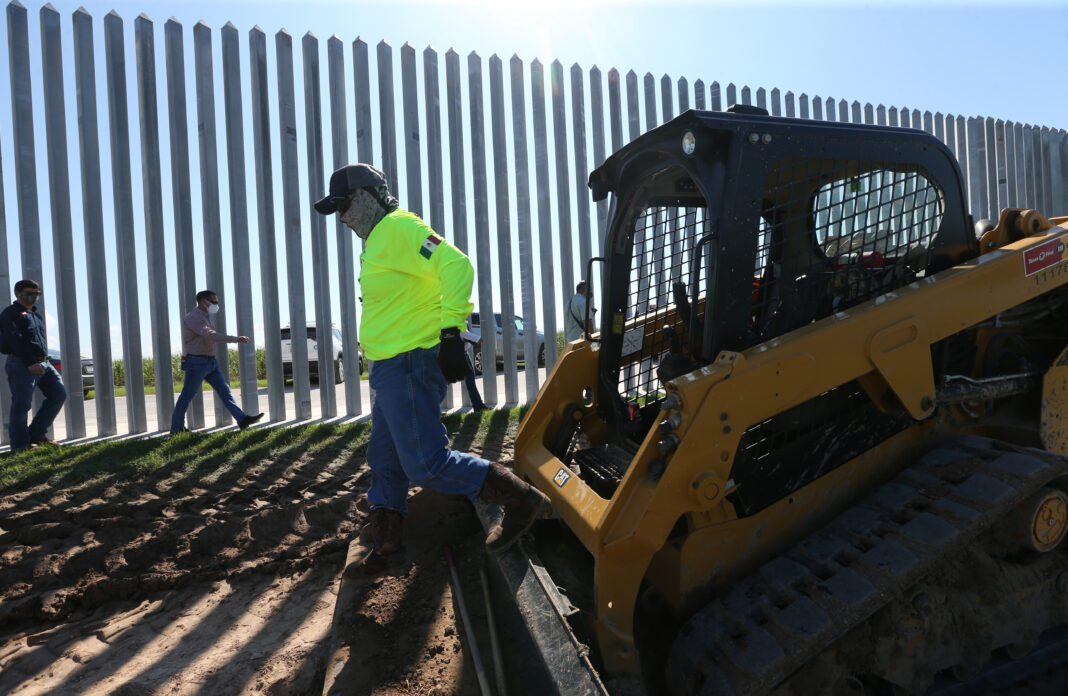A pair of lawsuits against those involved in building a stretch of private border wall south of Mission may finally be moving forward after being stalled for nearly two years in federal court.
The two lawsuits — the first filed by the North American Butterfly Association on behalf of the National Butterfly Center, and the second filed by the U.S. Attorney’s Office on behalf of the International Boundary and Water Commission — saw the first signs of forward progress in over a year during a status conference Wednesday morning.
The butterfly center sued the private wall builders in state court in late 2019, claiming the 3-mile stretch of galvanized steel bollard fencing threatened to impinge upon their property rights. The center also sued the project’s fundraisers, claiming they had defamed the center’s executive director, Marianna Treviño Wright.
Just days after the butterfly center filed its suit, the federal government filed a lawsuit of its own, claiming that the project — the riverside construction of which was then in its infancy — put the United States in violation of a 1970 international boundary treaty with Mexico.
After a judge lifted a temporary restraining order in January 2020 which had temporarily halted the private wall’s construction, North Dakota construction magnate Tommy Fisher had his crews resume work on the structure, leaving the three sides to continue their battles in court.
But not much has happened in court since then, though plenty has happened outside the courtroom — including a pending criminal case in New York federal court, news that Fisher is looking for a private buyer for the wall, and a cat-and-mouse game between soil erosion and efforts to mitigate it.
As those events have swirled outside of court and generated national headlines over the last year, attorneys in the two local lawsuits have met in court several times to discuss the progress — or lack thereof — in the cases.
Though the lead prosecutor in the government’s lawsuit, Assistant U.S. Attorney Eric Paxton Warner, was present during an August 2020 walking tour of the wall led by Fisher himself, it wasn’t until this year that the government announced it had contracted to have the structure formally inspected.

(Delcia Lopez | [email protected])
Warner confirmed during a May 5 hearing that the government had hired the global engineering firm Arcadis to examine the wall. And on Wednesday, he said the majority of the firm’s analyses are nearing completion.
“We are on pace, your honor, to deliver those expert reports to the Fisher defendants, your honor, and then we’ll go from there,” Warner said, adding the analyses should be complete by Aug. 27.
“I have not yet seen the structural integrity report, or the hydraulic report, and they’re finalizing the geotech analysis,” he said.
Warner added that the U.S. has yet to hear from its Mexican counterparts in the IBWC.
The binational organization requires both nations to work together on approving any development projects within the Rio Grande flood plain; however, the Mexican arm of the commission — La Comisión Internacional de Límites y Aguas — has thus far provided little feedback.
As for how Arcadis’ conclusions will affect the IBWC’s lawsuit, that remains to be seen.
Fisher’s attorney, Mark Courtois, remained hopeful Arcadis’ analyses would find what his client has insisted from the start — that the private wall is safe and resilient.
“I don’t think we’re gonna find that there’s much, if any, issue with this fence project,” Courtois said.
“If their experts come in with some opinions that are way out of left field, I guess we’re gonna be fighting it,” he added a moment later.
Barring a settlement, the government expects to go to trial in December.
Meanwhile, the butterfly center should know in approximately three weeks whether it will finally be able to begin the discovery process in its own lawsuit.
Thus far, the center has been impeded by court order from conducting discovery on both Kolfage and WBTW due to the New York criminal case, and that has, iun turn, limited its ability to conduct discovery on the other defendants.
Prosecutors in the New York criminal case froze the We Build the Wall’s assets, leaving the local attorneys representing it — David Oliveira and Thomas Haskins — unpaid for their services for the last year.
In May, U.S. District Judge Randy Crane denied the attorneys’ request to withdraw their services from the lawsuit, saying he was unwilling to leave the defendants without legal representation.
But that wouldn’t necessarily have been the case since attorney Kris Kobach has also been going unpaid.
Kobach is the former Kansas secretary of state and once served as an immigration adviser to President Donald Trump. He is also listed on We Build the Wall’s website as a member of the nonprofit’s advisory board and serves as its general counsel.
Kobach has made three appearances in McAllen federal court throughout the pendency of the two lawsuits — first in December 2019, when he successfully argued to have WBTW and Kolfage dismissed as defendants in the government’s lawsuit, and again in March to insist that funds would soon be freed up to pay the WBTW attorneys in the butterfly center’s suit.
On Wednesday, Kobach made his third appearance to announce that, though the U.S. Second Circuit Court of Appeals had denied an appeal to unfreeze WBTW’s assets, the nonprofit will soon be able to access money derived from donations made after the New York criminal indictment came down.
“Since the decision came down, We Build the Wall has been taking these assets in the form of uncashed checks at this point,” Kobach said.
“We should have a total as to how much is available to pay our legal bills probably as early as the end of this week or next week,” he said.
For the butterfly center’s attorney, Javier Peña, however, WBTW’s claims that it hasn’t been able to access money to pay its legal fees have all been part of a deceit meant to impede the lawsuit. Peña was careful, however, to emphasize he doesn’t think Oliveira or Haskins have been part of that deceit.
“I don’t blame Mr. Haskins or Mr. Oliveira for this because I don’t think they were in the know on this. But We Build the Wall has had money this entire time. So, this delay I think has been obtained by We Build the Wall on false pretenses,” Peña said Wednesday.
In the end, Crane gave We Build the Wall an additional three weeks to clear up their financial questions before making a decision on whether or not to allow Oliveira and Haskins to withdraw. They will return for a status conference on Aug. 26.
As for when a trial will occur, Crane said he’s aiming for a February trial date, citing his belief that the government’s lawsuit will have a significant impact on the butterfly center’s own.





